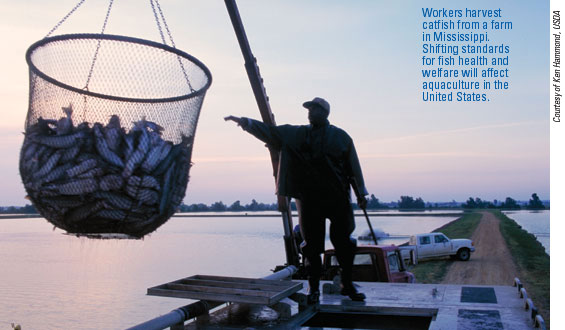Standards taking shape for health, welfare of fish
|
The welfare of fish could soon be subject to regulations—or at least guidelines—similar to standards for the welfare of other animals. The European Union is about to adopt regulations for the welfare of farmed fish, which could affect trade with the United States and other countries. The World Organization for Animal Health, or OIE, has created committees to develop guidelines for the welfare of animals in aquaculture. The AVMA Aquatic Veterinary Medicine Committee also has begun to examine guidelines for the welfare of aquatic animals.
"How do we get ahead rather than react?" asked Dr. T.J. Myers, a consultant to the committee from the Department of Agriculture's Animal and Plant Health Inspection Service, during the Sept. 30-Oct. 1 AVMC meeting. He added, "We do have to get our heads around welfare issues because they impact what we do." Existing U.S. health regulations for fish don't directly address welfare, but health is one measure of welfare. Evolving welfare standards could change health standards, which would in turn affect any veterinarian who works with fish. And the United States is in the process of drafting a National Aquatic Animal Health Plan. Canada and the European Union are also developing and consolidating health regulations for fish and other aquatic animals, which will incorporate welfare. Fish welfareAt the AVMC meeting, members started in-depth deliberation on the welfare issues of fish and other aquatic animals. They discussed the subject in light of conflicting scientific studies of awareness levels in cold-blooded creatures—and also along the lines of cultural standards, philosophic arguments, and regulations that might affect welfare standards. "The science is not clear on the aquatic welfare issues," said Kevin H. Amos of the National Marine Fisheries Service, who is helping develop the National Aquatic Animal Health Plan. "And perceptions on animal welfare vary greatly in different parts of the world." Later this year, the Standing Committee of the European Convention for the Protection of Animals kept for farming purposes plans to adopt a document containing 21 articles about the welfare of farmed fish. According to the preamble, the committee considers "that in the light of established experience and scientific knowledge about the biological needs of fish, methods of husbandry and slaughter at present in commercial use may fail to meet all their needs and hence result in poor welfare." Other subsections of the document outline regulatory requirements for aquaculture of fish—including stockmanship and inspection; enclosures, buildings, and equipment; management; changes of genotype; changes of physical appearance; "emergency killing"; and research. Dr. David Scarfe, AVMA assistant director of Scientific Activities and AVMC staff assistant, suggested the European Union appears to be applying the precautionary principle by adopting regulations for the welfare of fish and other aquatic animals without fully developing evidence of the needs of cold-blooded creatures. "This philosophical approach currently appears pervasive in many aquatic animal welfare issues in Europe," Dr. Scarfe said. Dr. Myers said APHIS is planning to comment on the proposal for fish welfare, primarily to encourage the European Union to postpone finalizing rules until the OIE completes deliberations on the welfare of aquatic animals. The OIE work groups are in the process of developing guidelines for the transport and slaughter of finfish. The OIE Aquatic Animal Health Standards Commission will consider the guidelines early next year. Fish healthIn the United States, the Joint Subcommittee on Aquaculture has not included the welfare of aquatic animals as an area for consideration by the National Aquatic Animal Health Task Force. The federal and state governments have a variety of regulations on fish health, though not on fish welfare as such. Many of the regulations address disease control and food safety. Ten working groups have met so far to help develop and consolidate regulations for the National Aquatic Animal Health Plan, which has a completion deadline of early 2007. The groups have discussed the roles and responsibilities of veterinary and nonveterinary professionals in the health of aquatic animals; the roles of federal, tribal, state, and local governments; diseases of regulatory import and their surveillance; laboratory testing procedures; and standards for disease programs for specific animals—including farmed warm- and cold-water finfish; tropical, bait, and ornamental finfish; and mollusks and crustaceans. The National Aquatic Animal Health Task Force is also coordinating with Canada on that country's aquatic animal health program during biannual meetings. The European Commission's proposal on the health of farmed fish, which is separate from the proposal on the welfare of farmed fish, focuses on disease prevention and international trade. Dr. Scarfe anticipates that the AVMC will address the interrelated issues of health and welfare of aquatic animals as well as the role of the veterinary profession in these issues, in keeping with AVMA priorities for animal welfare. Internet resources Information about the National Aquatic Animal Health Plan is available at www.aphis.usda.gov/animal_health/animal_dis_spec/aquaculture/naah_plan.shtml. The full text of the European proposal on fish health is available at http://europa.eu.int/eur-lex/lex/LexUriServ/site/en/com/2005/com2005_0362en01.pdf. The full text of the European proposal on fish welfare is available at http://europa.eu.int/eur-lex/lex/LexUriServ/site/en/com/2005/com2005_0297en01.pdf. Information about OIE initiatives on animal welfare is available at www.oie.int/eng/bien_etre/en_introduction.htm. The AVMA positions on animal welfare are available here. .
| ||
